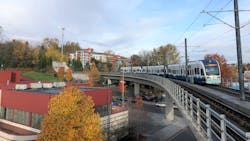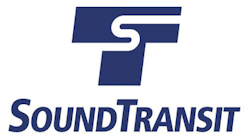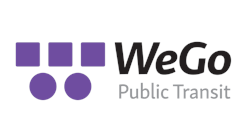Amazon investing $300 million to develop affordable housing in Nashville, Washington, D.C. area and Puget Sound area
Amazon has committed to investing a combined $300 million in three metropolitan areas to develop a total of 3,000 affordable housing units near transit.
The transit-oriented developments are part of Amazon’s Housing Equity Fund it announced during its fourth quarter 2020 earnings call in February 2021. The company has committed to investing $2 billion “to preserve and create over 20,000 affordable housing units” in Nashville, Tenn., Arlington, Va., and the Puget Sound region in Washington state. Amazon explains the Housing Equity Fund below-market loans and grants to housing partners, public agencies and minority-led organizations.
Puget Sound region
Sound Transit will work with Amazon to accelerate the creation of up to 1,200 affordable housing units on the agency’s surplus properties near light-rail stations across the region. Sound Transit says the first $25 million of the $100-million investment will fund pre-development activities, while the remaining $75 million will support the construction of new affordable housing, which is expected to begin within five years.
"Housing and transit are intertwined and this latest commitment will help ensure families from all income levels will benefit from the build out of mass transit—greater affordability and equitable economic opportunity, easy access to daily needs, and the environmental benefits of reduced traffic congestion and car reliance,” said Amazon Head of Community Development Catherine Buell.
Amazon previously committed to funding $185.5 million in below-market loans and grants to King County Housing Authority to preserve affordability for 1,000 apartments.
"Increasingly, we are facing an affordable housing crisis across the entire Puget Sound region, and Sound Transit is expanding rail service into communities that are becoming less and less affordable for working families," said Sound Transit CEO Peter Rogoff. "We have a forward-leaning policy of partnering with developers to facilitate affordable housing near our stations, but obtaining the necessary funding to build those units has always been a challenge. Amazon's $100 million commitment to help fill that gap and make transit more accessible to those who need it the most is truly welcome and appreciated."
Washington, D.C., area
The goal with the Washington, D.C., area investment is to create more than 1,000 new affordable housing units at Metro Stations throughout the area. Amazon explains the $125 million commitment will “expedite development of affordable homes so that moderate- to low-income families in the National Capital Region can afford to live in communities with easy access to employment, schools, healthcare, education and other amenities.”
Amazon will work with the Washington Metropolitan Area Transit Authority (WMATA). WMATA Board Chair Paul Smedberg lauded Amazon for “stepping up to the plate” and said the investment will accelerate transit-oriented development, grow ridership and keep the area competitive with other global economic centers.
“Transit-oriented development has a proud legacy at Metro, and with this investment from Amazon we can continue to help the region tackle the challenges of housing affordability, congestion, and sustainability,” said WMATA General Manager/CEO Paul J. Wiedefeld. “Having a philanthropic partner in this effort, along with the support of the public and private sectors, puts the region on the best path possible to meeting our shared housing, transit, equity, and economic prosperity goals.”
Nashville, Tenn.
In Nashville, Amazon has committed to working with WeGo Public Transit to invest $75 million to develop 800 affordable homes near WeGo high-capacity transit corridors. The transit-focused housing development investment follows Amazon’s December 2020 donation of $2.25 million to The Housing Fund nonprofit in Nashville to help moderate- to low-income households preserve homeownership and build financial stability.
Amazon explains the top two largest expenses for most U.S. households are housing and transportation.
“Nashville is one of Amazon’s newest communities, and we’re committed to supporting—and partnering closely with—our new neighbors,” said Michelle Gaskin Brown, Amazon’s Nashville Manager of Public Policy. “Building on our $2.25 million donation to The Housing Fund last year to help moderate- to low-income Nashville families preserve homeownership amid tornado recovery, job loss, and the ongoing pandemic, we’re now turning our attention to the development of affordable housing with convenient access to transit. We believe everyone should have access to housing they can afford, and we look forward to working with the city of Nashville on even more innovative solutions to help local families achieve long-term stability.”
WeGo CEO Steve Bland added, “By strategically placing affordable housing units along our frequent routes, we can ensure riders have equitable access to public transportation. We are committed to advancing equity, diversity, and inclusion with our Better Bus plan and in our outreach to the community.”
Developers, non-profits or public agencies interested in applying for funding in any of the areas above can apply for support through this Amazon website.

Mischa Wanek-Libman | Group Editorial Director
Mischa Wanek-Libman is director of communications with Transdev North America. She has more than 20 years of experience working in the transportation industry covering construction projects, engineering challenges, transit and rail operations and best practices.
Wanek-Libman has held top editorial positions at freight rail and public transportation business-to-business publications including as editor-in-chief and editorial director of Mass Transit from 2018-2024. She has been recognized for editorial excellence through her individual work, as well as for collaborative content.
She is an active member of the American Public Transportation Association's Marketing and Communications Committee and served 14 years as a Board Observer on the National Railroad Construction and Maintenance Association (NRC) Board of Directors.
She is a graduate of Drake University in Des Moines, Iowa, where she earned a Bachelor of Arts degree in Journalism and Mass Communication.





